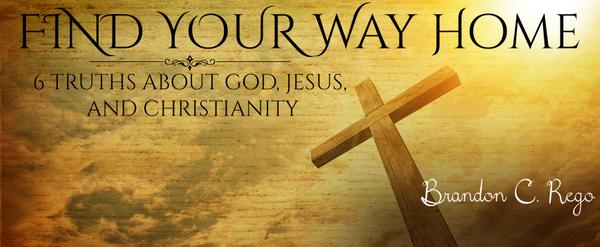 Every day of our lives we absorb millions of pieces of information into our minds that, over time, form the way we look at the world. The problem is, the things we're taught are not always true. Especially when it comes to religion, there are so many people and ideas out there that it's almost impossible to have a clean view of it.Find Your Way Home: 6 Truths About God, Jesus, and Christianity examines some of the most common and frustrating myths that culture has taught us about Christian spirituality. Ranging all the way from the hard subject of Hell (and people's wrong ideas about it) to inspirational reminders about God's real love, the book is written in a completely non-combative tone; all from the point of view of an everyman making his simple observations about eternal truths.In the book, there are 6 Cultural Myths about Christianity that the author unpacks based on his own observations from watching himself and other Christians.Each myth is examined not with heady theology, but with clean and straightforward verses. In this heartfelt book, the author speaks to everyday people, using everyday insights to share truths that are both simple and profound.
Every day of our lives we absorb millions of pieces of information into our minds that, over time, form the way we look at the world. The problem is, the things we're taught are not always true. Especially when it comes to religion, there are so many people and ideas out there that it's almost impossible to have a clean view of it.Find Your Way Home: 6 Truths About God, Jesus, and Christianity examines some of the most common and frustrating myths that culture has taught us about Christian spirituality. Ranging all the way from the hard subject of Hell (and people's wrong ideas about it) to inspirational reminders about God's real love, the book is written in a completely non-combative tone; all from the point of view of an everyman making his simple observations about eternal truths.In the book, there are 6 Cultural Myths about Christianity that the author unpacks based on his own observations from watching himself and other Christians.Each myth is examined not with heady theology, but with clean and straightforward verses. In this heartfelt book, the author speaks to everyday people, using everyday insights to share truths that are both simple and profound.
We have seen logo designs and feel like we have seen them before, or they do not seem too unique. It is where you have probably come across a generic logo design that is not doing much for your brand. Your logo design is often the first interaction that potential customers have with your brand that is why it is important for your logo design be effective. A logo design is much more than just an image or a text which states that it has to be original and creative. For a brand that wants to attract customers and stand out from the competition must have a compelling and attractive logo design that can deliver the right message to the audience. Logo designers know and value the importance of professional logo design to any business either it is large, small or just a startup. It represents the company, it tells their story and symbolizes their brand identity to the world. No matter how good your products or services are, if your logo design is poor, you are...
Comments
Post a Comment